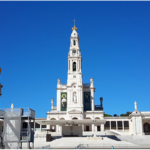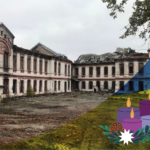Interview with Provincial Father Stefan Tertünte SCJ about dream jobs, community and people on the margins.
What were you thinking when you stood for election as Provincial?
You must know that up to now I have always had dream jobs in the community. After my studies in Freiburg and a year in Paris, there was the chaplaincy in Krefeld, a very good but also difficult time. We still had the luxury there that we, as pastor and chaplain, only had to look after one parish. I knew the people on the street, and not only the faithful!
This was followed by a phase of further qualification with the dissertation on our founder of the community. This was a gift, since I am very interested in history and it was also my task to investigate the social aspects of the life of Leo Dehon. A topic that had already occupied me very much as a youth.
Then I was very briefly in Handrup in the school chaplaincy. There I was able to experience everything that is possible in this field. The eight years in Oberhausen were the next dream job. There, together with Father Ernst-Otto Sloot and Father Gerhard Valerius, I founded a new community with the mission of developing new forms of living together in an urban context. In the Centro shopping center, I was allowed to try out many things that are not usually done in communities.
And then I was in Rome for nine years, where I soon directed the Centro Studi Dehoniani. This task was formative in many ways, especially because I was able to experience our worldwide congregation, which is so alive and so diverse. We tend to lose sight of this treasure, this spirit of awakening and the impulses we receive from there. The work in the service of our identity – the search for the writings of our founder, or that I was able to introduce young confreres profoundly to the history and spirituality of our order – I have felt as a privilege. And it has strengthened me in my own vocation.
Then, when the request to be elected Provincial came, it had something to do with availability and also obedience: I was always allowed to do what I could easily say yes to. Now I followed the call of the confreres and the Superior General. Even though this office was absolutely not at the top of my list of favorite activities.
What was the feeling then when you were actually elected?
This was actually no longer a surprise. But in the first days and nights I was already restless, I had a thousand things on my mind – the handing over of my work in Rome, what all is the task of the Provincial, questions about the present and future of the Dehonians in Germany. In addition, I was restless because I had not lived in Germany for nine years.
How did you start your office then?
In the first period – which is not yet finished – there were many goodbyes and new beginnings at the same time. In addition, it was clear to me relatively quickly that the first thing I had to do was to get to know my confreres, especially the way they experience their lives, their activities, and their being Priests of the Sacred Heart today. That is why I visited the communities and took time for my confreres. Of course, with the perspective of what can come out of this for the future, and what this can mean for the individuals and the communities.
And what conclusions have you drawn from these visits so far?
In this regard, I would first like to emphasize that, contrary to what many think, the task of the Provincial is above all a spiritual one. In this regard, canon law says that superiors “strive, together with the members entrusted to them, to build a fraternal community in Christ, in which God is sought and loved above all.”
What does that mean in translation for you here in Germany?
My job is to give suggestions and make sure that some important things don’t fall out in the day-to-day business, and to remind people what our basic mission is.
If there is one thing that has become clear to me in the last decades and has become a basic conviction, it is this: togetherness needs time! Time for the individual with Christ and with the confreres to share the spiritual and what concerns my life. One must not save at the wrong end. I find that the confreres are very committed and for the most part very content in the areas in which they work. Then it is my job to look from time to time to see if all the doing doesn’t lead to us no longer doing enough for each other. If there is not enough time for us to enrich ourselves together, then the decisive aspect of our religious life is missing.
And people also notice this: whether we are enthusiastic individual fighters on the road or whether we come from a community and do our ministry out of it. If we live in community, then we also experience all the relationship issues that other people also have, then we talk differently with people about life, for example, also when it comes to failure in life.
To what extent is this important for you and your tasks as Provincial?
This statement applies to all people who want to live as a Christian: It is a lifelong process to become the person God had in mind when He created us. We must also be aware of this sentence when we speak of our vocation. Then our vows were not empty phrases, but the yes to exactly this path of God-willed self-realization and dedication to people.
We are to let our rule of life come into its own as a companion to life. This also takes time, and we need to find formats for devoting ourselves to this rule of life by reading about it, praying about it, and talking about it with one another.
My basic task is to recognize over time who and what needs to change. But the first thing that needs to change is not the houses – but myself! I still have to grow into my task.
And: as Provincial, I will not announce any changes, but we have different formats and decision-making bodies here to discuss and decide how to shape the Province.
Will the vision that the confreres “under 65” have developed also play a role?
For the inner view and as a member of the Sacred Heart priests, this vision is a strong statement for me. At the moment, for me, the most important word in it is still “we” – that is, again, that we do this not as individuals, but in fraternal community.
And I think it’s beautiful that it says, “In deep communion with Jesus Christ,” because that’s the breeding ground of our apostolate. I still have in mind what I often heard from the generation before us: “We came to be priests, not for religious life.” – I’m reading a document from 1892 that begins with the words, “We are an active and contemplative congregation.” Both must have time and form.
And what I like most about the Province’s vision formula is the attention to people on the margins.
Who are these from your point of view?
One can include all or at least many of them. In Rome it was very clear: impoverished and single elderly people, homeless people, families below the subsistence level, migrants and refugees. Who “the people on the margins” are here for the communities, each must make up its own mind. But that is the bar we have set for ourselves.
And my own experiences in Rome have shown me that close contact with these people is the most direct way to God.
Now this sounds very Dehonian……
Yes, Leo Dehon has also asked: What is going on in our society and in our church? He was very attentive to processes of change. And his perception has led him to care a lot about the working class, about education and about an economic way that must take into account ethical perspectives. He has seen and demanded the “calls of the world.” The church must be fit in the social question.
That is why we must always look today: Who are those of us who are marginalized and excluded, and how can we make our contribution to greater solidarity and togetherness? When I think of the discord in our society, the question also arises as to what our small contribution is to ensuring that people and groups remain capable of conversation.
Is this now a new orientation of the German Province of the Order?
This is actually not new. My predecessor, Father Heinz Lau, also speaks of the unity of mysticism and politics. And that is precisely what appealed to me as a young person about the Sacred Heart priests. I think it is important that we take care – through our spirituality – to understand and read the processes of change in the Church and in society, not simply to condemn them. It is important that we know and understand more than what is negotiated at the regulars’ tables.
And at the same time, Jesus did not close his eyes to the misery and poverty of the world. But he discovered a love that is able to transform it.
That is why the message of Jesus on the cross with the open heart is so important and very concrete: yes, there is suffering, injury, death, evil. But we believe that there is a resource of love that helps to overcome it. There is the kingdom of justice and love.
So what is the bottom line of your first few weeks as Provincial?
I received the phrase from Rome, “I wish you much humility and patience.” This sentence accompanies me. These early days are still characterized by much openness and appreciative perception of what exists: in the works, the confreres and collaborators.
But as for my patience, when I am a spiritual director for a person, I can be the most patient person. On the other hand, as a provincial, there is the danger of impatience, especially when I see necessities to change and decide something. So I make it clear to myself: at some point, all the impressions I’m gathering now have to result in a picture, and we have to discuss what will come out of it and what should develop. We have the appropriate forums and committees for this.
One final question: What is your life like outside of being a “provincial”?
In the first weeks and months there was this challenge of many conversations and driving back and forth. There I feel this place Neustadt, the monastery and the park a beautiful place for my base camp and to breathe. I like to hike, I want to ride my bike more again, and I like to watch good movies. Reading used to be part of it, too, but unfortunately that has become very functional lately – while I also like to read for pleasure, gladly historical biographies, but also contemporary literature, a nice novel. Everything else will come with time.
- Dein Reich Komme, 66 (2022) 10-13.




